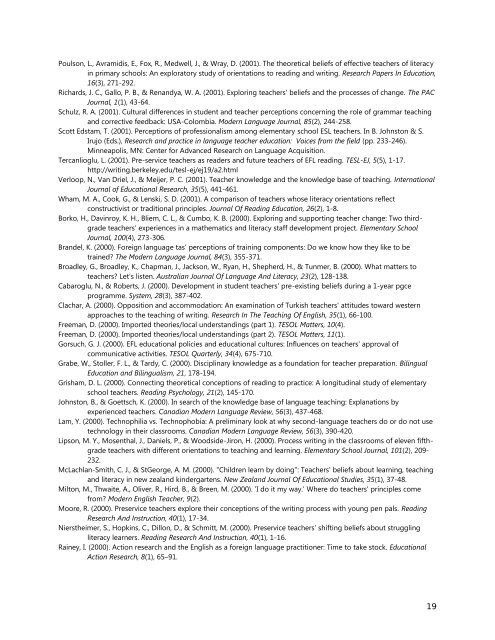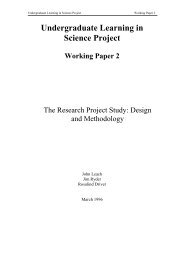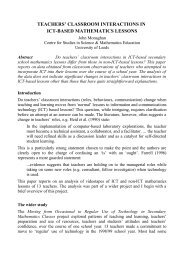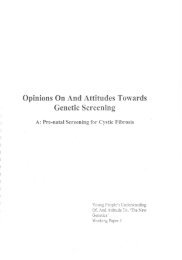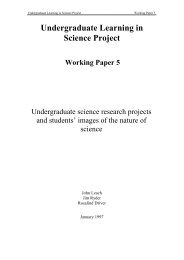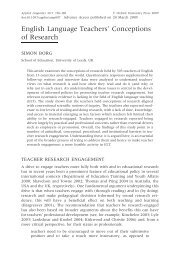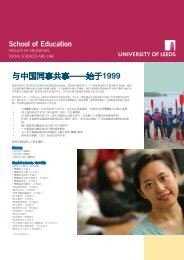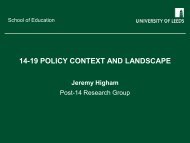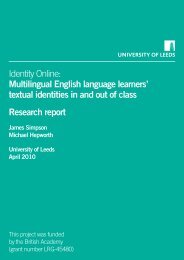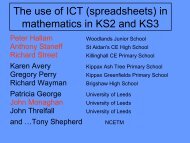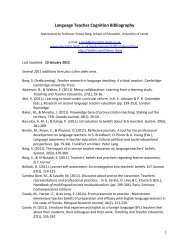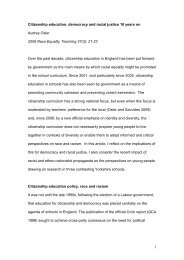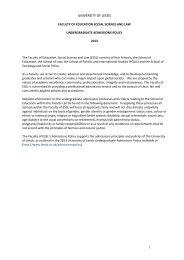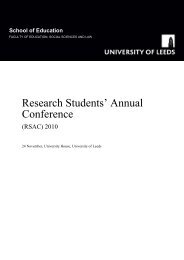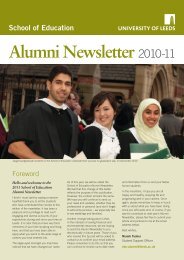Language Teacher Cognition Bibliography - School of Education
Language Teacher Cognition Bibliography - School of Education
Language Teacher Cognition Bibliography - School of Education
Create successful ePaper yourself
Turn your PDF publications into a flip-book with our unique Google optimized e-Paper software.
Poulson, L., Avramidis, E., Fox, R., Medwell, J., & Wray, D. (2001). The theoretical beliefs <strong>of</strong> effective teachers <strong>of</strong> literacy<br />
in primary schools: An exploratory study <strong>of</strong> orientations to reading and writing. Research Papers In <strong>Education</strong>,<br />
16(3), 271-292.<br />
Richards, J. C., Gallo, P. B., & Renandya, W. A. (2001). Exploring teachers' beliefs and the processes <strong>of</strong> change. The PAC<br />
Journal, 1(1), 43-64.<br />
Schulz, R. A. (2001). Cultural differences in student and teacher perceptions concerning the role <strong>of</strong> grammar teaching<br />
and corrective feedback: USA-Colombia. Modern <strong>Language</strong> Journal, 85(2), 244-258.<br />
Scott Edstam, T. (2001). Perceptions <strong>of</strong> pr<strong>of</strong>essionalism among elementary school ESL teachers. In B. Johnston & S.<br />
Irujo (Eds.), Research and practice in language teacher education: Voices from the field (pp. 233-246).<br />
Minneapolis, MN: Center for Advanced Research on <strong>Language</strong> Acquisition.<br />
Tercanlioglu, L. (2001). Pre-service teachers as readers and future teachers <strong>of</strong> EFL reading. TESL-EJ, 5(5), 1-17.<br />
http://writing.berkeley.edu/tesl-ej/ej19/a2.html<br />
Verloop, N., Van Driel, J., & Meijer, P. C. (2001). <strong>Teacher</strong> knowledge and the knowledge base <strong>of</strong> teaching. International<br />
Journal <strong>of</strong> <strong>Education</strong>al Research, 35(5), 441-461.<br />
Wham, M. A., Cook, G., & Lenski, S. D. (2001). A comparison <strong>of</strong> teachers whose literacy orientations reflect<br />
constructivist or traditional principles. Journal Of Reading <strong>Education</strong>, 26(2), 1-8.<br />
Borko, H., Davinroy, K. H., Bliem, C. L., & Cumbo, K. B. (2000). Exploring and supporting teacher change: Two thirdgrade<br />
teachers' experiences in a mathematics and literacy staff development project. Elementary <strong>School</strong><br />
Journal, 100(4), 273-306.<br />
Brandel, K. (2000). Foreign language tas’ perceptions <strong>of</strong> training components: Do we know how they like to be<br />
trained The Modern <strong>Language</strong> Journal, 84(3), 355-371.<br />
Broadley, G., Broadley, K., Chapman, J., Jackson, W., Ryan, H., Shepherd, H., & Tunmer, B. (2000). What matters to<br />
teachers Let's listen. Australian Journal Of <strong>Language</strong> And Literacy, 23(2), 128-138.<br />
Cabaroglu, N., & Roberts, J. (2000). Development in student teachers' pre-existing beliefs during a 1-year pgce<br />
programme. System, 28(3), 387-402.<br />
Clachar, A. (2000). Opposition and accommodation: An examination <strong>of</strong> Turkish teachers' attitudes toward western<br />
approaches to the teaching <strong>of</strong> writing. Research In The Teaching Of English, 35(1), 66-100.<br />
Freeman, D. (2000). Imported theories/local understandings (part 1). TESOL Matters, 10(4).<br />
Freeman, D. (2000). Imported theories/local understandings (part 2). TESOL Matters, 11(1).<br />
Gorsuch, G. J. (2000). EFL educational policies and educational cultures: Influences on teachers' approval <strong>of</strong><br />
communicative activities. TESOL Quarterly, 34(4), 675-710.<br />
Grabe, W., Stoller, F. L., & Tardy, C. (2000). Disciplinary knowledge as a foundation for teacher preparation. Bilingual<br />
<strong>Education</strong> and Bilingualism, 21, 178-194.<br />
Grisham, D. L. (2000). Connecting theoretical conceptions <strong>of</strong> reading to practice: A longitudinal study <strong>of</strong> elementary<br />
school teachers. Reading Psychology, 21(2), 145-170.<br />
Johnston, B., & Goettsch, K. (2000). In search <strong>of</strong> the knowledge base <strong>of</strong> language teaching: Explanations by<br />
experienced teachers. Canadian Modern <strong>Language</strong> Review, 56(3), 437-468.<br />
Lam, Y. (2000). Technophilia vs. Technophobia: A preliminary look at why second-language teachers do or do not use<br />
technology in their classrooms. Canadian Modern <strong>Language</strong> Review, 56(3), 390-420.<br />
Lipson, M. Y., Mosenthal, J., Daniels, P., & Woodside-Jiron, H. (2000). Process writing in the classrooms <strong>of</strong> eleven fifthgrade<br />
teachers with different orientations to teaching and learning. Elementary <strong>School</strong> Journal, 101(2), 209-<br />
232.<br />
McLachlan-Smith, C. J., & StGeorge, A. M. (2000). "Children learn by doing": <strong>Teacher</strong>s' beliefs about learning, teaching<br />
and literacy in new zealand kindergartens. New Zealand Journal Of <strong>Education</strong>al Studies, 35(1), 37-48.<br />
Milton, M., Thwaite, A., Oliver, R., Hird, B., & Breen, M. (2000). 'I do it my way.' Where do teachers' principles come<br />
from Modern English <strong>Teacher</strong>, 9(2).<br />
Moore, R. (2000). Preservice teachers explore their conceptions <strong>of</strong> the writing process with young pen pals. Reading<br />
Research And Instruction, 40(1), 17-34.<br />
Nierstheimer, S., Hopkins, C., Dillon, D., & Schmitt, M. (2000). Preservice teachers' shifting beliefs about struggling<br />
literacy learners. Reading Research And Instruction, 40(1), 1-16.<br />
Rainey, I. (2000). Action research and the English as a foreign language practitioner: Time to take stock. <strong>Education</strong>al<br />
Action Research, 8(1), 65–91.<br />
19


